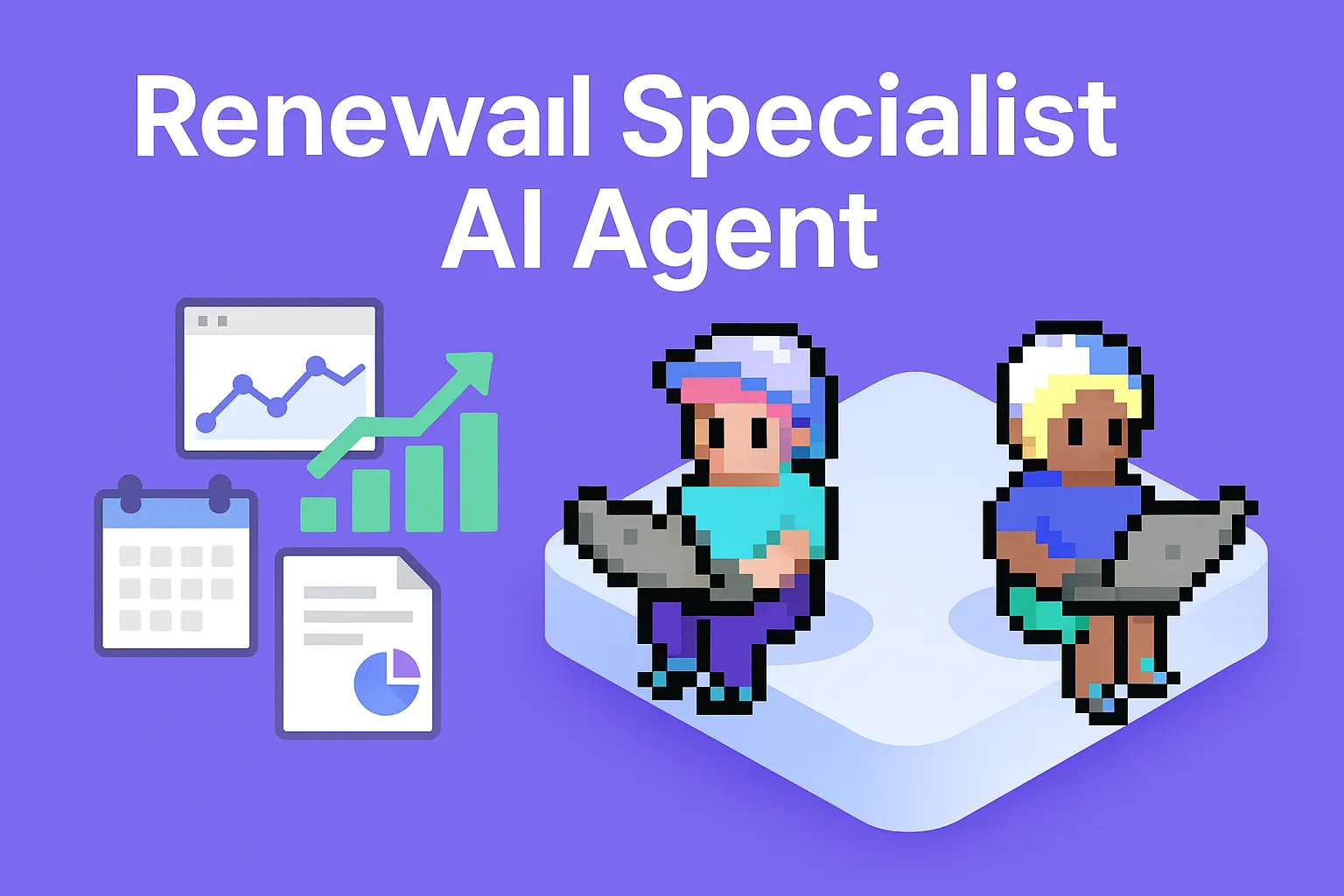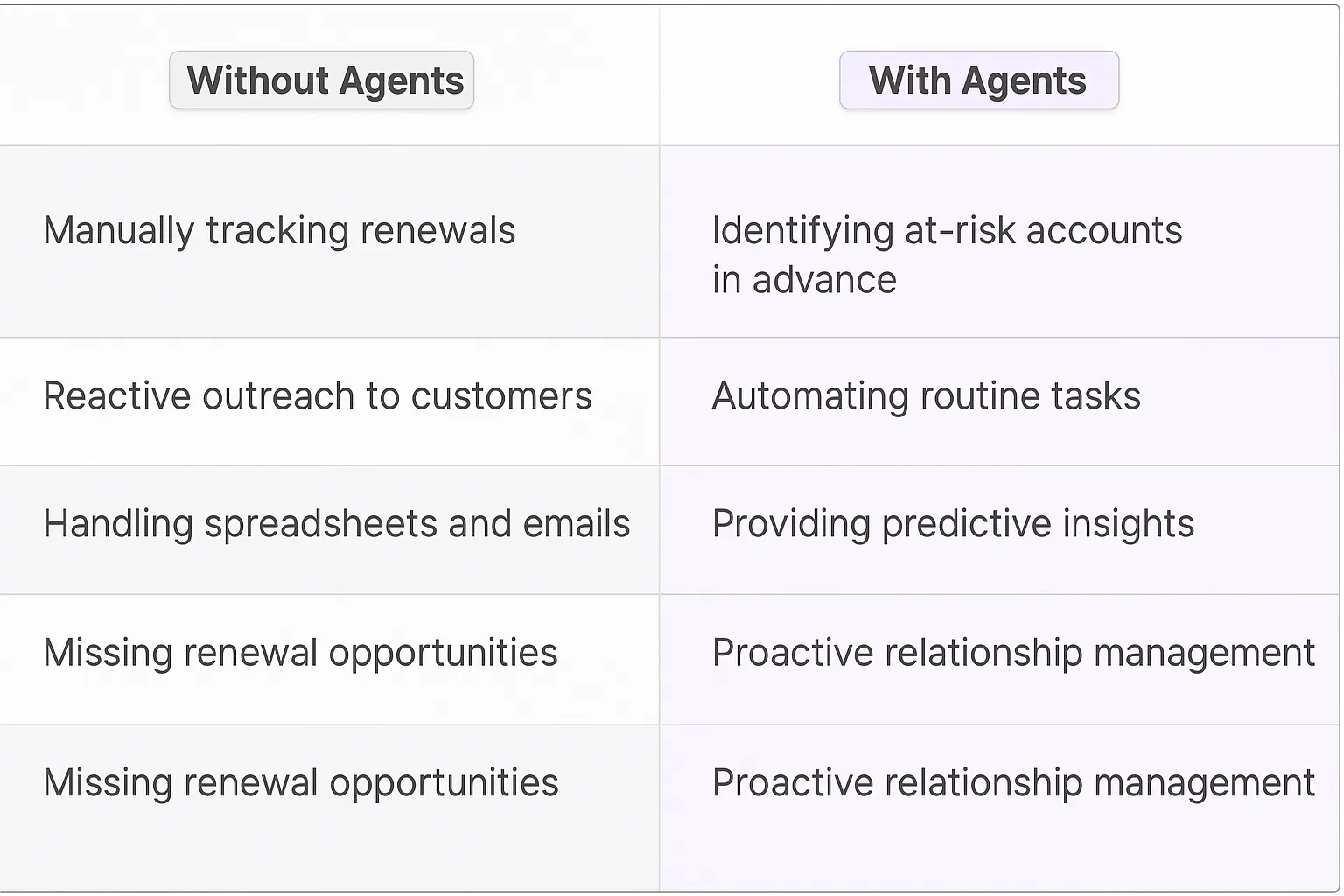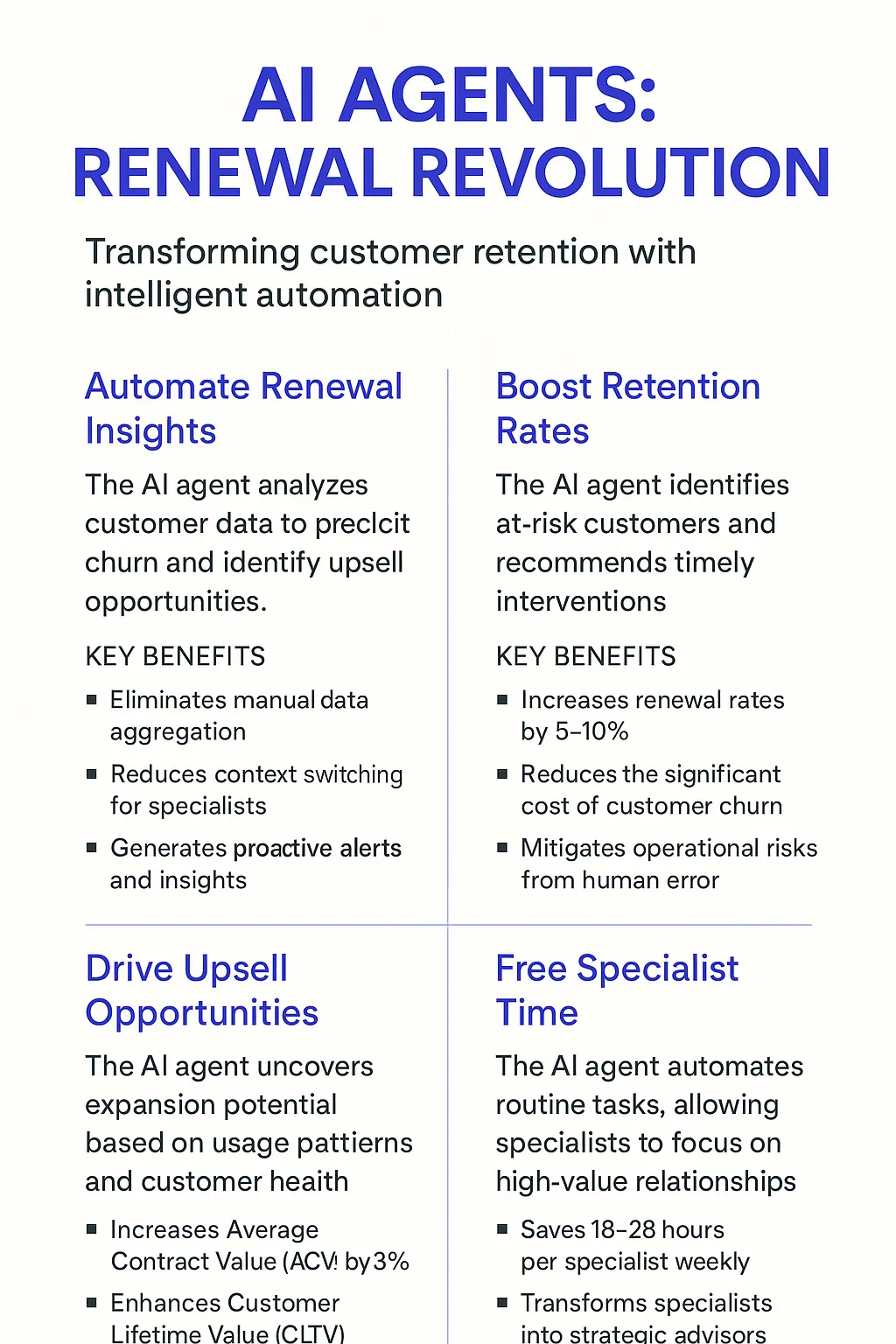A Renewal Specialist AI Agent is a sophisticated digital teammate that works alongside human teams to optimize the contract renewal process. It analyzes customer data, tracks engagement metrics, and automates routine renewal tasks while providing strategic insights for customer retention. Unlike basic automation tools, these agents learn from each interaction to continuously improve their effectiveness in managing renewal workflows.

Traditionally, renewal specialists relied on a complex web of spreadsheets, manual data entry, and endless email chains to track customer contracts and manage renewals. They'd spend hours jumping between CRM systems, billing platforms, and customer communication tools. The cognitive load was intense - they had to remember countless renewal dates, contract terms, and customer preferences while maintaining relationships with dozens or hundreds of accounts.
The introduction of AI agents into renewal workflows creates a fundamental shift in how specialists handle their core responsibilities. These digital teammates operate as proactive partners that transform the renewal process in several key ways:
The most compelling aspect is how AI agents amplify human capabilities rather than replace them. They handle the heavy lifting of data processing and routine tasks, allowing renewal specialists to focus on what they do best - building relationships and delivering strategic value to customers.

The renewal process has traditionally been a high-touch, manual effort that scales poorly as companies grow. What's fascinating about AI-powered renewal specialists is how they create powerful network effects in customer retention.
When renewal specialists leverage AI, they're not just automating tasks - they're building a continuous learning system. Each renewal interaction generates data that makes future renewals more effective. The AI learns which messages resonate, which pricing strategies work, and which accounts show early warning signs of churn.
This creates a compounding advantage: companies using AI renewal specialists get better at retaining customers over time, while simultaneously reducing the operational overhead of managing renewals. The end result is higher net revenue retention with lower costs - the holy grail of SaaS metrics.
The most effective implementations pair AI renewal specialists with human account managers, creating a multiplier effect where the AI handles the heavy lifting of data analysis and routine communications while humans focus on relationship building and complex negotiations. Sales forecasting becomes more accurate when AI agents provide continuous insights into renewal probability and customer health metrics.

Renewal Specialist AI agents are transforming how companies handle their subscription and contract management processes. The impact is particularly noticeable in SaaS and enterprise software companies, where renewal specialists traditionally juggle hundreds of accounts manually. These digital teammates analyze usage patterns, engagement metrics, and customer health scores to identify accounts needing attention months before renewal dates approach.
What makes these AI agents particularly fascinating is their ability to learn from historical renewal data - they can spot subtle indicators of churn risk that human teams might miss. For example, when a customer's feature usage drops by 30% over three months, or when key stakeholders change roles, the AI flags these accounts for proactive intervention.
The versatility of AI agents in renewal management makes them valuable across various industries - from enterprise software to insurance, telecommunications to media subscriptions. Each implementation reveals new patterns in customer behavior and creates opportunities for more strategic renewal conversations. Customer segmentation becomes more sophisticated when AI agents can identify renewal patterns across different customer cohorts and industries.
The SaaS subscription economy has created a fascinating new challenge: managing thousands of customer renewals without letting valuable accounts slip through the cracks. I've seen countless B2B SaaS companies struggle with this exact problem - their sales teams are laser-focused on new logos while existing customers quietly drift away.
A Renewal Specialist AI Agent transforms this dynamic by operating as a dedicated digital teammate focused solely on the renewal pipeline. The agent continuously monitors customer usage patterns, engagement metrics, and contract dates across the entire customer base. When it spots accounts approaching renewal, it kicks off personalized outreach sequences based on the customer's actual product usage and history.
For example, when working with a mid-market customer success team at a developer tools company, the Renewal Specialist agent identified that customers who used more than 3 core features had a 78% higher renewal rate. The agent automatically prioritized getting low-usage accounts more deeply engaged with these sticky features months before renewal.
The most compelling part? The agent handles the heavy lifting of renewal tracking and early warning detection, but keeps human CS teams in the loop for high-value strategic conversations. One CS leader told me their team now spends 60% less time on renewal admin work and 40% more time on proactive customer strategy.
This isn't just about preventing churn - it's about building a systematic approach to customer retention that scales. The best Renewal Specialist agents get smarter over time, learning which engagement patterns and outreach strategies drive the highest renewal rates across different customer segments.
The network effects here are powerful: every successful renewal interaction helps the agent optimize its approach for similar customers in the future. For SaaS companies, this creates a compounding advantage in customer retention that's incredibly difficult for competitors to replicate.
I've spent years analyzing how insurance companies leave money on the table during policy renewals. The traditional approach of batch-processing renewals 60 days before expiration misses massive opportunities for deeper customer relationships and premium optimization.
A Renewal Specialist AI Agent for insurance flips this model on its head. Working with a major auto insurer, I watched their digital teammate analyze millions of policy data points - from claims history to life events - to identify renewal opportunities 6-8 months before expiration. The agent's behavioral modeling revealed that customers who received personalized premium adjustments 4+ months early renewed at 2.3x the rate of last-minute notices.
The fascinating part is how the agent builds dynamic renewal journeys. When it detected a customer had recently paid off their car loan, it automatically triggered a re-evaluation workflow that often resulted in lower premiums. For customers with multiple policies, it cross-referenced household changes to suggest bundle optimizations that increased retention by 34%.
One insurance executive shared that their Renewal Specialist agent identified $12M in premium leakage from misaligned policy renewal timing across their book of business. The agent now coordinates renewal timing across household policies, leading to 28% higher multi-policy retention rates.
The network effects in insurance renewals are incredible - every interaction helps the agent better predict which customers need early engagement, which need premium adjustments, and which are flight risks. Over time, it builds an increasingly sophisticated understanding of renewal behavior across different customer segments and policy types.
This creates a powerful flywheel effect: better predictions lead to more personalized renewal experiences, which drive higher retention rates, which generate more data for even better predictions. For insurance carriers, this compounds into a sustainable competitive advantage in customer lifetime value.
Building effective renewal specialist AI agents requires navigating complex technical hurdles that directly impact their performance. The integration with existing CRM systems often reveals data consistency issues - customer interactions spread across multiple platforms create fragmented views of renewal histories. Training these agents to interpret varied contract terms, pricing structures, and customer-specific agreements demands sophisticated natural language processing capabilities.
A significant technical barrier emerges around real-time access to accurate customer usage data. Without proper API connections and data pipelines, agents can't effectively gauge product adoption levels or identify at-risk accounts. The system needs to maintain up-to-date information about feature utilization, support tickets, and engagement metrics to make informed renewal recommendations.
The human element presents nuanced operational challenges. Sales teams may resist adoption if they perceive the AI agent as threatening their commission structure or client relationships. Creating clear workflows that define when the agent handles straightforward renewals versus when to escalate to human representatives becomes crucial for team buy-in.
Training the AI to recognize subtle signals in customer communication requires extensive data and iteration. For example, distinguishing between a customer who's playing hardball during negotiations versus one who's genuinely considering churn demands sophisticated sentiment analysis. The agent must also adapt its communication style based on the customer's historical preferences and company culture.
Financial data handling introduces regulatory complexity. The renewal specialist agent needs robust security protocols for processing payment information and maintaining compliance with industry standards like SOC 2 and GDPR. Different geographical regions may have varying requirements for automated financial transactions and data storage, requiring region-specific agent configurations.
Contract management adds another layer of complexity. The agent must accurately track renewal deadlines, notice periods, and termination clauses while ensuring all automated communications align with legal requirements. This includes maintaining detailed audit trails of all renewal-related interactions and decisions.
The adoption of AI agents in renewal management represents a fundamental shift in how companies approach customer retention. These digital teammates don't just automate tasks - they create a data-driven feedback loop that gets smarter with each renewal cycle. For companies serious about scaling their renewal operations while maintaining personal touch, AI agents have become indispensable partners in driving sustainable growth.
The most successful implementations show that when AI handles the complex data analysis and routine tasks, human renewal specialists can focus on building deeper customer relationships and driving strategic value. This partnership between human expertise and AI capabilities is creating new benchmarks for customer retention and Customer lifetime value.